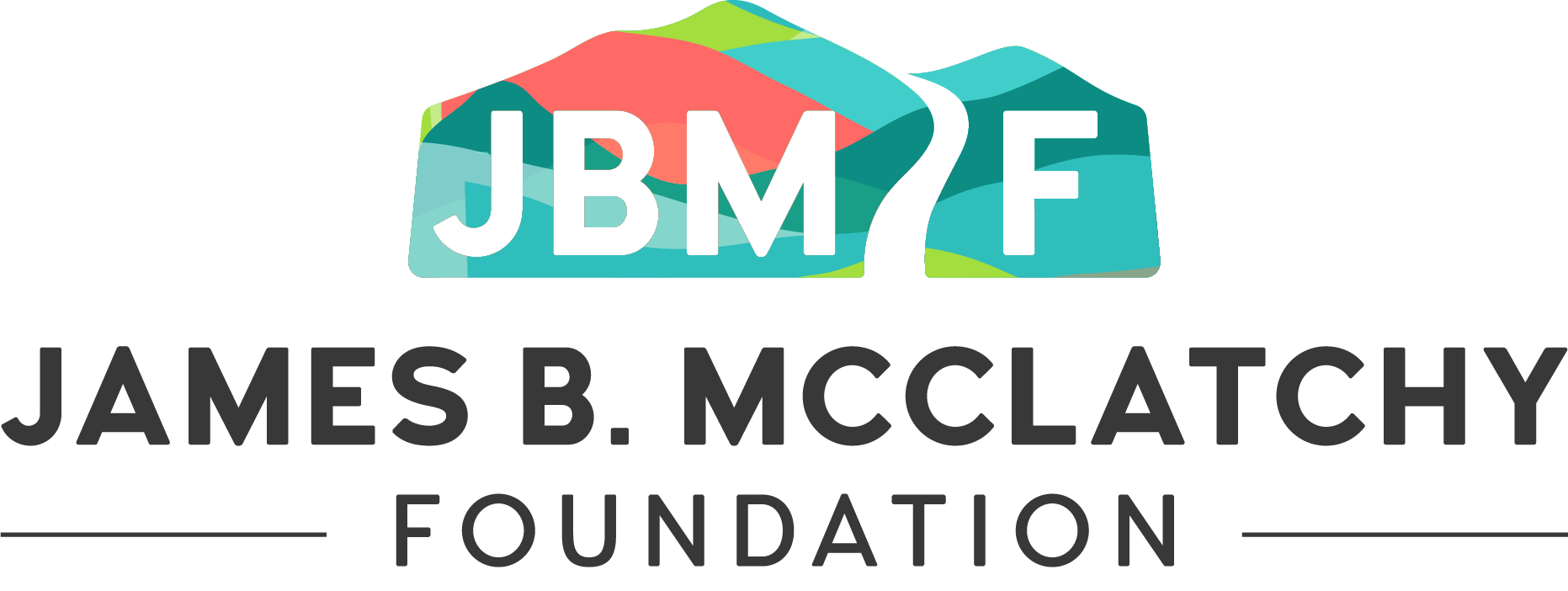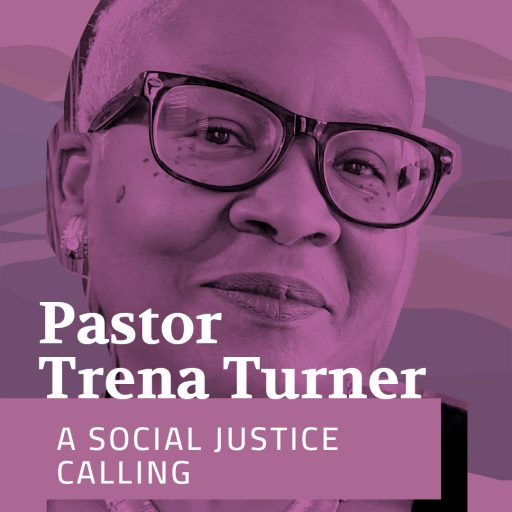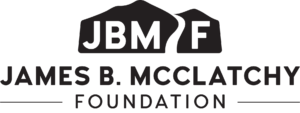“Many issues are won and perceptions shaped with organized lies. When we attempt to correct an organized lie with disorganized truth, people will continue to buy the organized lie. We are getting better at organizing the truth.”
Faith in the Valley is a faith-based grassroots community organization. Their mission is to unlock the power of people to put faith into action and to advance a movement for racial, economic, and environmental justice in our local communities and across the Valley. This is Pastor Trena’s StoryEngine*.
A Path Set Into Motion
I was born in Richmond, California. When I was seven years old, my father, Officer Herman George, was assassinated; killed in the line of duty in San Francisco. He was shot multiple times through a window at his office located in Hunter’s Point. This was in the late sixties, and [he was] a black officer in San Francisco. There were never any arrests. My dad was 33 years old when he was killed.
As the youngest sibling, I was devastated. I now realize that single tragic event set a path into motion that was only much later revealed. As an adult, I have more of an awareness or an analysis of what was perhaps at work. I’m born of an officer – the blue runs through my veins, which is interesting in the cross section of the work that I do today.
My Mom had her hands full raising four children, and we had a home filled with love. I married early – 17 to be exact. I’m still married – same husband, same amazing man. We’ve been married 42 years now.
I was recruited out of high school to work for the telephone company. I spent 25 years in the telecommunications industry. I was grateful for the job and felt blessed for all the experiences that it brought me. Towards the end of my career, my husband and I relocated to the San Joaquin Central Valley.
Building a Movement
After arriving in Stockton, my husband started a church and I supported him. It was a new “church plant,” Victory In Praise. The ministry really grew quickly. We were involved in many community philanthropic efforts – the feeding programs, giving out socks, shoes, coats, and other clothing. We gave out canned goods and hot meals in the winter and ice water in the summer. Victory In Praise facilitated afterschool programs, STEM programs, tutoring for children, and senior enrichment programs for seniors. We adopted apartment complexes and those kinds of things. Through our community work we met and became friends with Pastor Amelia Adams, pastor of the Open Door House of Prayer. Pastor Amelia was intricately involved with social justice work and introduced me to PICO, now Faith in Action, a national network.
I ended up attending a national organizer training facilitated by PICO held in Baltimore, Maryland. I was amazed at the shared community, stories, training, speakers,and the analysis of the root cause of structural and systemic oppression and racism.
The training challenged me to do my own research and ‘follow the money’. For the first time, I began to wonder, why are things so broken?
On the plane ride home, I created my idea of a social justice ministry on a flyer. I didn’t know how to connect it to organizing. I didn’t know that there were people that actually engaged in social justice as a career. I just experienced having my whole world shift and was thinking, we’ve got to do this at Victory In Praise.
When I came home, I continued to have conversations with people across the national network. They would ask me questions- one-to-ones is what they were doing. I began attending local training and eventually became a board member in San Joaquin County. I learned that there were five different grassroots organizations in the Central Valley that were working independently, within their counties, doing what my local PACT organization was doing. With a desire to acquire greater power and through many conversations, the five-county chapters determined that, as a merged entity, our efforts would have a greater impact on the whole of the Central Valley Region.
In October 2016, we had a founding convention that I co-facilitated. Over 2,000 people showed up at the Fresno Convention Center to witness the joining of five entities. We became Faith in the Valley, a powerful, new organization committed to advancing racial, economic and environmental dignity for all people. I was invited and agreed to participate in the interview process for their first Executive Director. When they offered me the job, I thought, God, I’ve been as honest as I know how through this process. There is so much I do not know about organizing, but I’ll do it because I trust you. God, you lead me, I will follow. And so I did accept the job. Faith in the Valley is my third career.
Living the Work
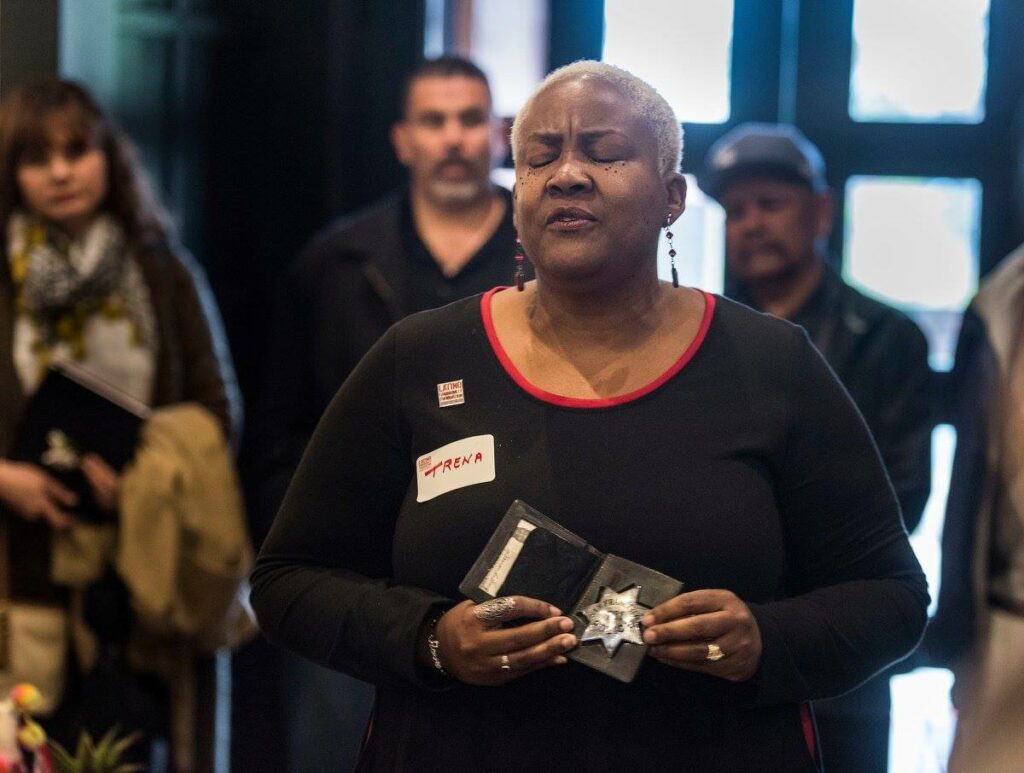 I’m learning a lot about dominant narratives. I’m learning that just because something has been repeated often and spread widely, does not mean that the information is credible or factual. I’m learning to go back to re-examine my history – not just the history of the United States, but from our African origins. I’ve learned that I do not have to hold all of the answers and analysis for problems that plague our society. I’ve learned to bring in people who have the knowledge and the lived experience, they truly are the experts. I surround myself with these experts and really just provide air cover and get out of the way so they can do the amazing work that they are doing.
I’m learning a lot about dominant narratives. I’m learning that just because something has been repeated often and spread widely, does not mean that the information is credible or factual. I’m learning to go back to re-examine my history – not just the history of the United States, but from our African origins. I’ve learned that I do not have to hold all of the answers and analysis for problems that plague our society. I’ve learned to bring in people who have the knowledge and the lived experience, they truly are the experts. I surround myself with these experts and really just provide air cover and get out of the way so they can do the amazing work that they are doing.
I think it interesting that I accepted, for 55 years, the retold story that my dad was randomly shot, at his office in SF, multiple times, from two separate windows, and there were never any arrests or credible witnesses. Though the truth may never be known, I now have an expanded way of thinking about the incident. The ’60s were a divisive time marked by the civil rights movement, anti-Vietnam protests, political assassinations, few African American officers employed, and officers killed in surprise attacks involving guns and bombs. The articles and newspaper clippings my family holds state that the officers were “victims of hatred and resentment taken to the level of assination”. Having more of a racial analysis of the time period, I now wonder, whose hatred and resentment?
Recently there was a 17-year-old young man who was brutally beaten by a police officer while driving home. He had just purchased a car; his girlfriend was behind him. He was speeding. For some reason, a gang task force thought that he was in a gang. When he saw [the police], he panicked. They did a pit maneuver and made him spin out. Instead of asking for his license, they dragged him out of the car, threw him on the ground and beat him severely. He ended up with a fractured orbital and boot prints on his face, only to find that he is an “A” student who had never been in trouble with the law.
We have worked extensively with the police department in the city of Stockton for four years. We’ve been on panels together. We’ve been in the procedural justice training together, and [still] you had officers that were comfortable to jump and beat someone, regardless of his age. They couldn’t have feared for any consequences. This is the [police department] that I thought we had the most progress with. For it to occur here, I was heartbroken. I’ve been asking myself: Is this really the right way? Should we still be encouraging the community to work with us?
Even while being involved in this work and people wanting to fight for racial justice, we still have a lot of work to do on anti-Blackness. Right after [the] George Floyd incident, there were numerous calls into Faith in the Valley, requesting that I share my analysis of the moment, asking what (non-Black) people should be doing in this moment to support. Though often overwhelmed with my own trauma, I started taking those assignments and felt it an obligation to share. I didn’t cut corners or mince words. Ultimately it was tiring and draining, but it felt good that people were listening. My prayer was that they’re not listening just for a moment, but that we actually would start to see changes. I saw people really leaned in. It made it acceptable to speak directly to behaviors instead of dancing around it or waiting for a more appropriate time.
People are beginning to understand their own prejudices and are having to address them and struggle with them. I didn’t mind people telling me they didn’t like what I said, or they were uncomfortable with what I said. It’s like: Good. That’s a great place to start now let’s move from there. Let’s interrogate why you’re uncomfortable with that truth.
It feels good that everybody didn’t just lean in for the moment and then back away from it. As I began to get too weary in the conversation I pointed people to numerous books, videos, podcasts, etc. Though for some it was apparently just a fad, there are others that I see that are continuing on in doing their own work. Racism is baked into every structure and system in America, whether subtle or outright. The work to undo what we’ve been taught is hard work.
Defining the Central Valley
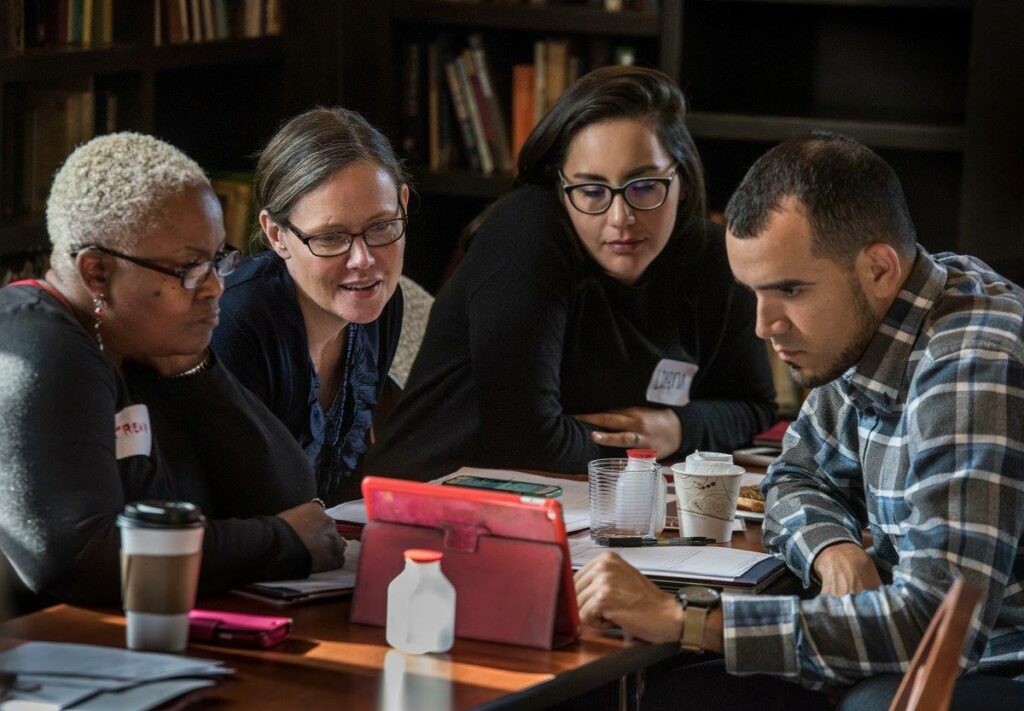 The Central Valley is made up of hard-working, beautiful people. It is an amazing place filled with people who have a deep love and connection to the Central Valley. With all of the inequities that exist in the Central Valley, what stands out most is the determination to thrive. I see the Central Valley as a room full of family members – from the celebrated newborn through the oldest and most respected. The Central Valley is a place that feels like home and belonging; the stories that are told, punctuated with the smells and tastes of the delicious and varied foods, are life-impacting.
The Central Valley is made up of hard-working, beautiful people. It is an amazing place filled with people who have a deep love and connection to the Central Valley. With all of the inequities that exist in the Central Valley, what stands out most is the determination to thrive. I see the Central Valley as a room full of family members – from the celebrated newborn through the oldest and most respected. The Central Valley is a place that feels like home and belonging; the stories that are told, punctuated with the smells and tastes of the delicious and varied foods, are life-impacting.
It’s a place where family and those connected can count on each other, but it’s also a place that can be pretty scary; filled with families that transitioned their wealth and beliefs from the deep south.
In the Central Valley with its rich and luscious vegetation and farmland, food insecurity is a huge issue. This is the food basket of the world, but the people who are feeding the world don’t have enough money to put food on their own tables. The very people that work under extreme conditions have no clear path to citizenship and lack adequate job conditions and health care. Homelessness is at an all-time high, housing is a huge issue and wages are low. You have high pre-birth and infant mortality rates and high rates of asthma due to the poor air quality. The schools in poorer neighborhoods aren’t as well-resourced as those in other areas. Public safety is a concern; Kern County was named the deadliest police force in the nation and there is a huge lack of trust between community and police in several other areas. There are many issues in the Central Valley.
The wealth and the richness that comes from the heart of the Central Valley is from the heart of the people, but the actual wealth – finances are held by very few. This is a place of Haves and Have nots. Historically, people have bought into this as commonplace, the way it’s always been, and aren’t broadly accustomed to civic engagement or social justice work. The James Irvine Foundation commissioned a report through Pacific Research Institute (PRI) a few years back that said out of ten opportunities to be civically engaged in the Central Valley, people were only engaged at a level of one.
It’s important to note the lack of involvement is not because people don’t care or want to be involved. With so many competing priorities, people frequently lack the capacity to be civically engaged.
Policies, however, are changed by enough people understanding and engaging in the issues and then showing up. If you have enough people involved, participating, sharing their stories of impact, encouraging others to vote, you can bring about change. This Valley needs change. We need engagement similar to what we witnessed in Georgia. I see change coming, but for the Central Valley, we’re still on the upswing of that curve.
Awakening New Voices
To engage communities that have may not previously participated in democracy, we go where people naturally gather. Primarily, for us, that is within multi-faith entities – churches, temples, mosques, community centers, but also to colleges, and to the streets. Through coming alongside existing efforts of faith and community leaders, our organizers bring in training and research that ties their priorities to possible policy wins. It’s powerful to witness a group of people that may have come together to worship now also gather to research and plan. Our role is to amplify community voices and ensure they are not silenced. We want people from every sector and background to know that elected officials work for them and that laws and policy should be in alignment with their values. Our faith leaders provide a consistent moral compass for us to follow.
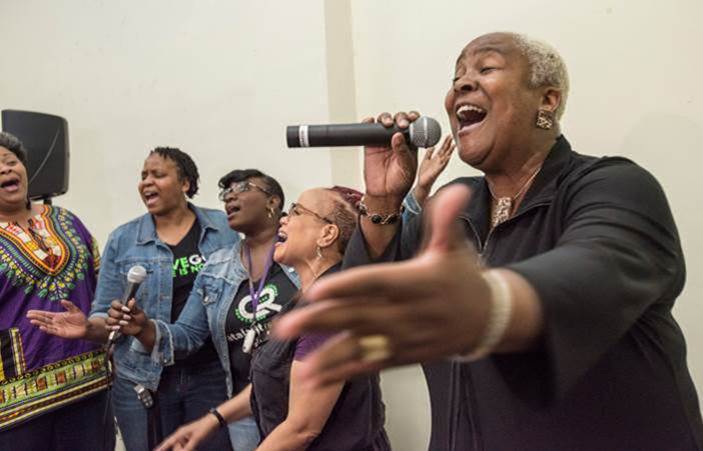
The young people who are coming into this work have my attention; they are loud, brash, sometimes unorganized, and opinionated, and I absolutely love it. We made an impact, but this next group – they are not settling for small incremental gains. When it was time to hit the streets in protest and demonstration after the George Floyd murder, the young people did not wait to have multiple meetings and discussions. They sensed that the time for action was now and moved accordingly. The energy and boldness of their fresh voices drew people in like magnets.
There’s a group out in Fresno that had concerns about air quality and started asking questions. They created an air quality monitor which they successfully got implemented in several schools and ended up meeting [former President] Barack Obama. There are young people in Kern that were intricately involved in researching, creating and submitting a People’s Budget that would better reflect the needs of their community. Many young people are intimately involved in public safety meetings and Know Your Rights training throughout the Valley.
Young people go hard for what they believe in. However, as I watch the organizers that are engaged now, I’m concerned about what appears to be a lack of balance and ability to find a place of peace. I’m seeing more and more organizers that are 100% locked into this work. The burden is heavy and pain is all around, but there has to also be joy. During the horrific years of enslavement, in spite of all of the atrocities, families still found time to have some joy, babies were still being made and people were still making love. There somehow was an innate understanding that celebrations had to occur.
Laughing, having fun and taking a break is a necessary practice in order to be able to rest, heal and rejuvenate. You don’t have to be a martyr to do this work and die on your own sword. You’re no good to anyone if you’re not taking care of yourself.
We’ve allowed wellness days on some Fridays to reflect, read, go to the beach – do something that will give you a woosah moment and be able to breathe. It’s okay to come out of it for a moment.
Fulfillment and Peace
At Faith in the Valley, I continually ask God, ‘why am I here?’ And how much longer do you want me to be here? Ever being mindful of creating opportunities for others, I don’t want to hold a space that someone else should have. God continues to reinforce my need to be here. My Faith in the Valley family are rockstars of social justice. I have confidence that each of them are holding the space in which they are most gifted and positioned for maximum effectiveness. So my fulfillment comes from God, choosing me to serve each of the members on my team, ensuring that I provide the aircover needed for them to achieve the mission of this amazing organization. My peace is found in doing what I was created to do, lead, in a way that brings glory to God by serving his people. I am eternally grateful to my family; husband, children, and grandbabies, to my close friends and to my church family. The wrap-around support, prayers, meals, and love in action shown is simply amazing and it is truly what allows me to be me.
*This story was produced as part of the Lifting Local Leaders storytelling initiative launched by the James B. McClatchy Foundation. “LIFT” references the inaugural pilot grantmaking program. These stories are guided by the StoryEngine methodology, an open-source, narrative-based, data collection tool developed by Loup Design
Published on the James B. McClatchy Foundation website using the Creative Commons License https://creativecommons.org/licenses/by-nc-nd/4.0/ : Attribution-NonCommercial-NoDerivatives 4.0 International (CC BY-NC-ND 4.0)
